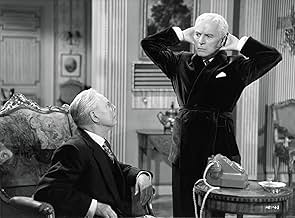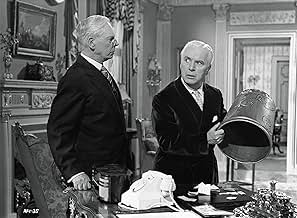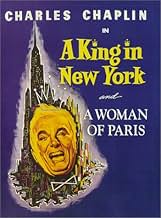IMDb रेटिंग
7.0/10
9.5 हज़ार
आपकी रेटिंग
अपनी भाषा में प्लॉट जोड़ेंA recently-deposed European monarch seeks shelter in New York City, where he becomes an accidental television celebrity and is later wrongly accused of being a Communist.A recently-deposed European monarch seeks shelter in New York City, where he becomes an accidental television celebrity and is later wrongly accused of being a Communist.A recently-deposed European monarch seeks shelter in New York City, where he becomes an accidental television celebrity and is later wrongly accused of being a Communist.
- पुरस्कार
- 1 जीत और कुल 1 नामांकन
फ़ीचर्ड समीक्षाएं
A great film that was neglected by the good old US of A when it was released in the late 50's. It was brandished as being to critical of the political atmosphere of the United States at the time. It's funny that Chaplin could manage to offend both Adolf Hitler (The Great Dictator) and the fascist-like/inspired 'anti-communist' movement of the 50's/early 60's U.S.A. There is actually a common link in those two movements (Naziism and the 50-60's 'anti-communist movement in the USA but I won't get into that here). Anyway, it is sad that this film is overlooked as it is one of Chaplin's best and should be looked as one in a career overview of this great filmmaker. Besides him, in the film there really is not any awe-inspiring actor/actress but Chaplin brings out the best in everyone and elevates them from eternal anonymity to something of recognition. His son Michael Chaplin for example is used quite wonderfully in this film. I later bought Michael Chaplin's late teenage memoir 'I Couldn't Smoke the Grass on my Father's Lawn' based on seeing him in this film and him impressing me so. It's too bad he could not develop more as an actor or recording star (he released a single in Britain in the mid-60's). I heartily recommend this film. See it and be open minded. Take a look at the way your country was run 50 years ago and ask yourself have things really changed this day in age when the 'communists' have know been replaced by the 'terrorists'.
When I rented this movie, I had no idae what to expect. Charlie Chaplin in a talkie?! I had just seen (heard?) how poor Buster Keaton's awful voice destroyed his presence as the classic stone-faced pantomine. Might Mr. Chaplin's performance in a speaking role be as sadly disappointing???
The answer in a resounding word was, "NO!" If anything, Chaplin's voice and accompanying ability to express himself with words enhanced his screen presence by providing a new dimension with which to appreciate his seemingly limitless talent.
I'm not sure just how to explain this other than the fact that I watched most of the film with a big grin glued to my face. I marvelled at the subtleties of Chaplin's performance which distinguish him not only as a silent movie actor, but as an actor of ANY era! In today's world of over-the-top silliness and questionable acting passing as good comedy, his performance is a clear indication that intelligent comedy is not an oxymoron and that the "King" of it is the same person as the king of slapstick.
If you're the kind of person who appreciates the subtlety in Woody Allen's humor, you will find yourself marvelling at "A King in New York" and you will see (and hear!) a part of Charlie Chaplin you may not ever have known existed.
The answer in a resounding word was, "NO!" If anything, Chaplin's voice and accompanying ability to express himself with words enhanced his screen presence by providing a new dimension with which to appreciate his seemingly limitless talent.
I'm not sure just how to explain this other than the fact that I watched most of the film with a big grin glued to my face. I marvelled at the subtleties of Chaplin's performance which distinguish him not only as a silent movie actor, but as an actor of ANY era! In today's world of over-the-top silliness and questionable acting passing as good comedy, his performance is a clear indication that intelligent comedy is not an oxymoron and that the "King" of it is the same person as the king of slapstick.
If you're the kind of person who appreciates the subtlety in Woody Allen's humor, you will find yourself marvelling at "A King in New York" and you will see (and hear!) a part of Charlie Chaplin you may not ever have known existed.
... while he himself was basically exiled in a strange land. 1957's "A King in New York" shows Chaplin at the end of his film career. In fact, it is the last film in which Chaplin himself stars. Refused permission to reenter the U.S. in 1952 due to the idea that he held anti-American beliefs, he actually made this film about a deposed European king in New York in England. The film suffers from production values that are not as high as they were in Chaplin's earlier films, and if you have the version Warner Brothers put out in 2004, the commentary points out that Chaplin had much trouble making this film mainly because he was not dealing with familiar personnel in his own studio as he had in his earlier efforts. The film's political statements are heavy-handed, but there are still some good comic turns by Chaplin and his viewpoints and comic bits on America and rampant commercialism and consumerism still hold up today. In fact, they are probably much more relevant today than they were when this movie was first made.
If you are curious about Chaplin's work you need to eventually view this film, just don't start your journey here. If you are just starting out, I recommend you view Chaplin's Mutual Comedies. These are 12 two-reel comedies Chaplin made in 1916 and 1917 and show his comic technique evolve from the pants-kicking fests of his Essanay and Keystone films into the sophisticated technique he had from the end of the series onward. Also, the Mutual period was named by Chaplin himself as the era in both his personal and professional life in which he was the happiest.
If you are curious about Chaplin's work you need to eventually view this film, just don't start your journey here. If you are just starting out, I recommend you view Chaplin's Mutual Comedies. These are 12 two-reel comedies Chaplin made in 1916 and 1917 and show his comic technique evolve from the pants-kicking fests of his Essanay and Keystone films into the sophisticated technique he had from the end of the series onward. Also, the Mutual period was named by Chaplin himself as the era in both his personal and professional life in which he was the happiest.
Someone once described "A King in New York" as the worst film ever made by a major artist. I can think of many worse examples and while this late Chaplin picture may lack the genius of his earlier work, (it was his penultimate film; he made it several years after "Limelight" and before "A Countess from Hong Kong"), it is an often very funny satire on what Chaplin perceived as 'the modern age'. Driven out of America by McCarthyism, Chaplin constructed his New York in a British studio and typical of its writer, director, star and composer it makes no apology for its attack on right-wing politics, in particular the HUAC, as well as television, Cinemascope and plastic surgery. It's also less sentimental than it might have been, (always Chaplin's biggest fault), but the plot involving a child played by Chaplin's own son Michael, does the film no favours. On the other hand, Chaplin himself is superb and Dawn Adams is surprisingly good as a television star. No masterpiece, then but not quite the disaster some people have said of it either.
Charlie Chaplin's A King in New York is a fine film to see when it's a laid-back afternoon and it comes on TV, as it's a bit of a surprise to come upon. It's a later Chaplin film, where he's no longer the iconic Tramp, yet in a way the logic of one of those films in terms of the society at large is still being toyed with. This time, instead of being on poverty row with holes in his shoes and a sweet and enduring love for a street girl, he plays a king whose country has gone to war and without many prospects financially comes to America to do commercials for products that he would surely rather not be pushing on the public. As life does imitate art (as far as the stereotype goes it does have a ring of constant truth), Chaplin at the time was an exile, kicked out of America for being a supposed communist, and with his non-prolific career going a little bit on the slide, he made the film as a quasi-light attack on American consumerism, of the vanity and stupidity that can come out of prosperity.
But at the same time, there is still the sensibility that Chaplin loves life and individuals, if not certain groups. This can be seen in the child character- one of Chaplin's own sons- who through his very intelligent but arrogant manner is one of the nicer and funniest characters in the film. While a lot of the humor, sometimes rather dry, is in seeing Chaplin's King and his assistant/butler talk of money problems and in the observations of the 'other', the best scenes come in showing what levels King Shadhov has to sink to in trying to pay his expensive hotel bills and stay afloat in a strange land. My favorite scenes where Shadhov's botched plastic surgery debacle, where it's funnier seeing the King trying not to laugh at a slapstick spectacle than the actual spectacle itself, and the scenes of the King trying to shill the items, often to the dissatisfied directors (I'm reminded of Lost in Translation, and in fact Chaplin's scenes are probably more successful than Coppola's).
Although the film is preachy at times- it's best when Chaplin goes for the more succinct jabs as opposed to the grandstanding, ironic since it worked perfectly at the end of the Great Dictator- the overall high-spirited and serenely theatrical direction makes this a worthwhile effort. Far from being the controversial film it got a reputation as following a non-release in the 50s in the US, it's only a cunning satire, with moments light and foreboding, and it deserves to be seen just as much as Chaplin's classics (if only by his fans, who might be apprehensive at the filmmaker making too many 'statements').
But at the same time, there is still the sensibility that Chaplin loves life and individuals, if not certain groups. This can be seen in the child character- one of Chaplin's own sons- who through his very intelligent but arrogant manner is one of the nicer and funniest characters in the film. While a lot of the humor, sometimes rather dry, is in seeing Chaplin's King and his assistant/butler talk of money problems and in the observations of the 'other', the best scenes come in showing what levels King Shadhov has to sink to in trying to pay his expensive hotel bills and stay afloat in a strange land. My favorite scenes where Shadhov's botched plastic surgery debacle, where it's funnier seeing the King trying not to laugh at a slapstick spectacle than the actual spectacle itself, and the scenes of the King trying to shill the items, often to the dissatisfied directors (I'm reminded of Lost in Translation, and in fact Chaplin's scenes are probably more successful than Coppola's).
Although the film is preachy at times- it's best when Chaplin goes for the more succinct jabs as opposed to the grandstanding, ironic since it worked perfectly at the end of the Great Dictator- the overall high-spirited and serenely theatrical direction makes this a worthwhile effort. Far from being the controversial film it got a reputation as following a non-release in the 50s in the US, it's only a cunning satire, with moments light and foreboding, and it deserves to be seen just as much as Chaplin's classics (if only by his fans, who might be apprehensive at the filmmaker making too many 'statements').
क्या आपको पता है
- ट्रिवियाThe first film that Sir Charles Chaplin made in the UK after his exile from America, and his last leading role in a movie.
- गूफ़During his diatribe, Rupert claims that the Roman Empire fell with the assassination of Caesar. Caesar's assassination occurred 17 years before the Roman Empire was established.
- भाव
[after being told that the political turmoil in America is just a "passing phase."]
King Shahdov: Quite so. In the meantime, I'll sit it out in Europe.
- इसके अलावा अन्य वर्जनOriginal British prints run about five minutes longer than the version that was released in America in 1976. It is this American version that is available on video, but the British cut is available on disc.
- कनेक्शनEdited into Histoire(s) du cinéma: Fatale beauté (1994)
टॉप पसंद
रेटिंग देने के लिए साइन-इन करें और वैयक्तिकृत सुझावों के लिए वॉचलिस्ट करें
- How long is A King in New York?Alexa द्वारा संचालित
विवरण
- रिलीज़ की तारीख़
- कंट्री ऑफ़ ओरिजिन
- आधिकारिक साइटें
- भाषा
- इस रूप में भी जाना जाता है
- Un rey en Nueva York
- फ़िल्माने की जगहें
- उत्पादन कंपनी
- IMDbPro पर और कंपनी क्रेडिट देखें
बॉक्स ऑफ़िस
- दुनिया भर में सकल
- $910
- चलने की अवधि
- 1 घं 50 मि(110 min)
- रंग
इस पेज में योगदान दें
किसी बदलाव का सुझाव दें या अनुपलब्ध कॉन्टेंट जोड़ें



































